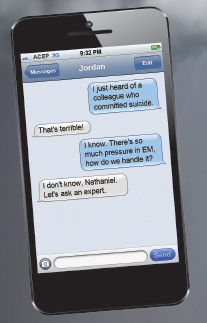
When I was an intern in 1976, I invited a good friend over for dinner. She had been having some trouble with her boyfriend, and I was hoping to cheer her up. I cooked dinner, and we talked. The evening was a connected one, and at its end, I offered her a plant cutting, which I had made for her. This was my way of saying I care. She declined my gift. The next day, I was told that she had committed suicide the morning following our evening of friendship. I felt so guilty. I almost quit my internship that week.
Explore This Issue
ACEP Now: Vol 35 – No 01 – January 2016Here Is What I Wish I Knew
Depression is insidious. It sneaks up and can take you down in an instant.

Nathaniel Mann, MD, is a resident in the department of emergency medicine at the University of Cincinnati in Ohio. Jordan Celeste, MD, is president of the Emergency Medicine Residents’ Association and an emergency physician in Florida.
We as physicians, and other health care professionals, are not good at recognizing burnout and depression in ourselves. We are perfectionists and expect ourselves to be experts from day one, which is unrealistic.
The most difficult task, and the most important when you believe a friend or colleague is depressed, is to reach out and offer your help. If your assistance is refused, share your concern with another friend and ask again.
The most difficult task, and the most important when you are having difficulty, is to reach out and ask for help. Admitting your own struggle and powerlessness is a big first step in helping yourself. It takes courageous humility.
Seeking to establish a relationship and talk with a therapist is not something to be ashamed of. It should be something to be proud of. We all have our strengths, things we are good at, and we all have our opportunities, areas where we are weak. We need to seek out those who appreciate our strengths and assist us to get better in those areas where we fall short.
Time passes very quickly. There is always more work. There is not always more time. We need to treasure our families and our friends. We will never regret bringing more love to who we are and what we do.
Pages: 1 2 | Single Page



No Responses to “How Physicians, Health Care Workers Can Handle Depression, Burnout, and Suicidal Thoughts”